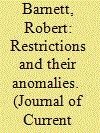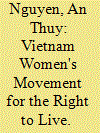| Srl | Item |
| 1 |
ID:
118421


|
|
|
|
|
| Publication |
2012.
|
| Summary/Abstract |
In 1994, at a meeting known as the Third Forum on Tibet Work, the Chinese authorities announced a series of restrictions on religious practice in the Tibetan Autonomous Region. Described by many outsiders in terms of abuses of rights, in fact those measures differed in important ways. By analysing the target, rationale and procedure of these restrictions, it becomes clear that some were relatively routine, while others were anomalous - their purpose was not explained by officials, the source of their authority was not clear, or the restrictions were simply not admitted to at all. These anomalous orders can be linked to major changes in underlying discourses of modernization and development among officials in Tibet at the time. They reflected undeclared shifts in attitudes to religion and cultural difference, and seeded the dramatic worsening in state-society relations that has taken place in Tibetan areas since that time.
|
|
|
|
|
|
|
|
|
|
|
|
|
|
|
|
| 2 |
ID:
163346


|
|
|
|
|
| Summary/Abstract |
This article examines the political and diplomatic struggles in urban South Vietnam from the perspective of women in the Vietnamese Women’s Movement for the Right to Live (WRL) during the Vietnam War. This movement was a timely response to the American war of aggression, which had destroyed the fabric of South Vietnamese society and drastically diminished women’s position within it by 1970. Under the leadership of Mrs. Ngô Bá Thành, the WRL fought for peace and women’s liberation through political action and shrewd diplomacy. Unlike female guerrilla fighters, the WRL maintained political autonomy and neutrality throughout the conflict. As a result, it was violently repressed by the Saigon government and quickly disbanded after the communist victory in 1975. Nevertheless, studying these politically sophisticated women’s anti-war efforts is crucial to understanding the symbiotic yet destructive relationship between Third World women and American imperialism during the twentieth century. It also helps dismantle essentialist assumptions about Asian women as inherently submissive and politically naïve. The WRL is a sterling example of Vietnamese women’s ingenuity in their dual struggle for national liberation and gender equality.
|
|
|
|
|
|
|
|
|
|
|
|
|
|
|
|